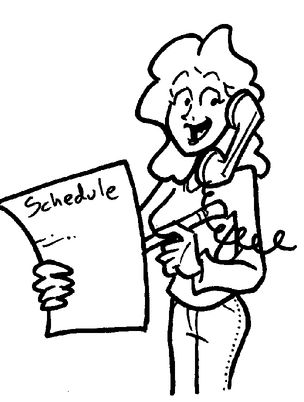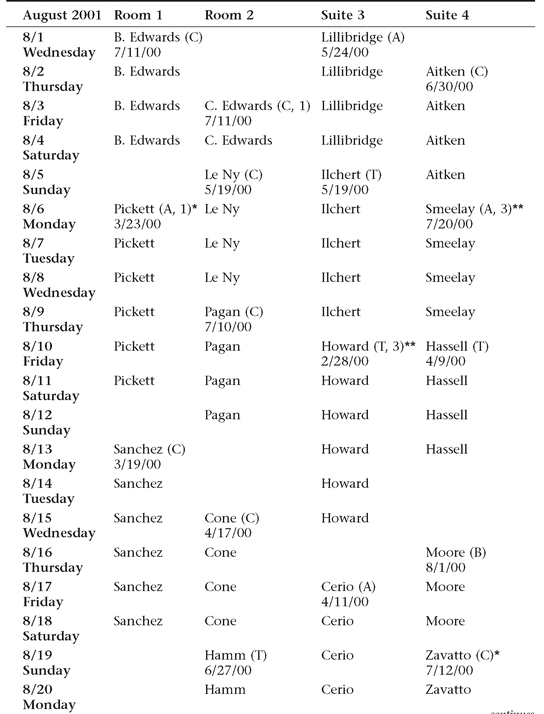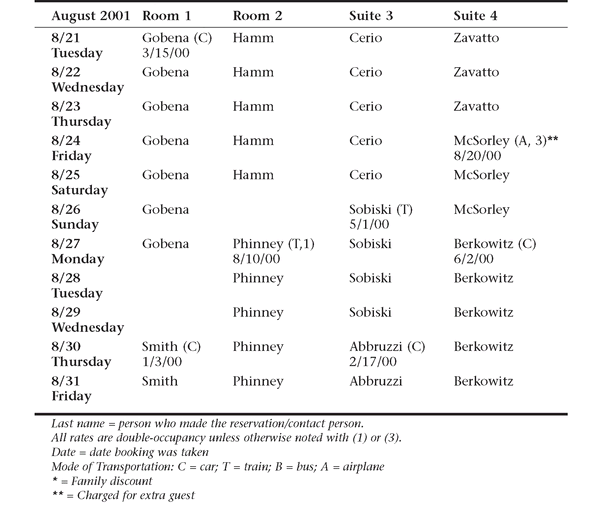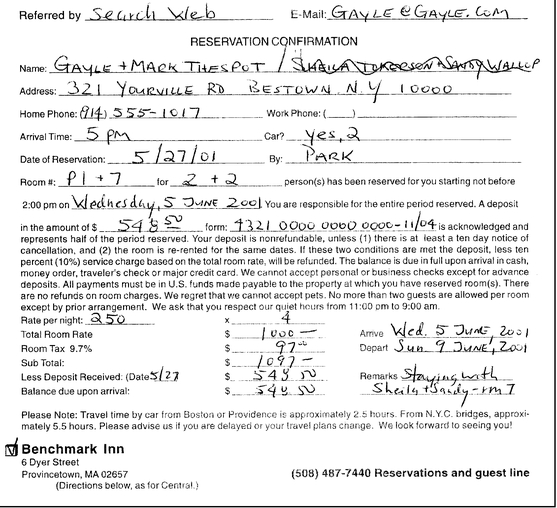
Chapter 17
One Day at a Time
In This Chapter
• Scheduling a daily routine
• Taking reservations
• Working with reservationists
Devoting an entire chapter to daily duties makes sense because the B&B business is pretty predictable. Every day you’ll make breakfast, meet and say goodbye to guests, make beds, take reservations, do laundry, do dishes, and do paperwork. These are just the basics. Throw in extra guest services such as nightly turndown and your day is already planned for you.
Try to stay in control of your daily schedule instead of letting it control you. If writing out an hourly schedule is the only way you can stay organized, do it. Sometimes the day will get away from you no matter how much scheduling you do. This happens to everyone. Don’t beat yourself up about it; keep your eye on the big stuff such as keeping your guests happy.
Schedule a Daily Routine
As we noted in Chapter 3, “What It’s Really Like,” your daily activities will be a combination of the routine and the unexpected; mostly the routine. Think about setting up your day before it begins. Evenings are a calm time to write out a to-do list for the next day. It will not only save you time in the morning, it can relieve that “I have so much to do I don’t know where to start” panic that can kick in at the start of a new day.
Here are some scheduling tips:
• Work around breakfast. The good thing about offering breakfast at your establishment is that this part of your day is already planned for you. Ever wonder why some B&Bs that serve a full breakfast schedule it so early? You will, too (unless you serve a continental-style breakfast), so you can have the rest of the morning to concentrate on other guest services such as cleaning up after breakfast and checking out guests. If you find that most guests are sleeping in on you, move your schedule around a bit. Consider serving your breakfast a little later—not so late that it cuts into the day—but keep getting up at the usual
 time. Do something in the morning that you’d normally do in the afternoon—but not laundry; you’ll deplete the hot water for the guests’ morning showers!
time. Do something in the morning that you’d normally do in the afternoon—but not laundry; you’ll deplete the hot water for the guests’ morning showers!

Coffee Talk
Consider this quick tip on how to handle everyday B&B life from Dr. Daniel and Evelyn Shirbroun, owners of the Joshua Tree Inn, Joshua Tree, California: “Do Fast. Be Fast. Go Fast.”

Inn the Know
Lock boxes are extremely popular now and a great way for guests to pick up their keys. The boxes are locked with a code that guests have to punch in. Just be sure to give guests the code before they arrive!
• Don’t check out during check-out. Try not to leave the house when guests check out or check in. The first and last thing guests will want to see at your B&B is your smiling face. If you can’t be there for guests when they arrive or depart, leave them a personal note with your apologies. As we’ve already mentioned, if they’re checking in, leave their key (determine a secure area with the guest before arrival) with instructions about the house, the breakfast schedule, and anything else they’ll need for the evening. If they’re checking out, leave them instructions on where to leave their key, a set of directions just in case, and maybe even something for the road (sweets or fruit, not hooch!).
• Keep on top of housekeeping. The chore of housekeeping is endless. When you finish cleaning a room or the kitchen there’s no time to enjoy your sense of accomplishment; you’ll need to start working on something else. As much as possible, break up housekeeping with other chores so it doesn’t seem as if it’s never-ending. It won’t be easy, though, because housekeeping in a B&B tends to schedule itself. If guests get up late and go out for a bit, you have to stop what you’re doing to ready their room for the day.
The best way to schedule cleaning is to jump at the chance to do it whenever you can. If you have fifteen minutes, tidy up the common areas. If a guest checks out early and you have a spare hour, don’t save cleaning the room for later; finish it up when you have the time. You never know what else will come up during the day but you can always count on something getting dirty and there is always potential for money coming through the door in the form of a walk-in. Staying on top of housekeeping will make a lasting impression on your guests and will help your business grow. No room at the inn for complacency!
• Penciling in personal errands. When it comes to taking care of personal business you might find yourself playing “catch me if you can.” Try to piggy-back your personal stuff with business-related errands or spend some extra money to get things delivered. If you need medications, have the prescriptions filled at a market that has a pharmacy so you can pick them up when you go out to shop. Do your banking and buy your stamps online. Consider paying the extra to have the B&B wash done by a laundry service; most services will pick up and deliver. Walk the dog with a purpose: Take Shortie, your Great Dane, to the mailbox, the store, the bank, or wherever you can go on foot. There will be many times when you’ll have to put your personal errands aside to take care of the B&B. Expect it; it goes with the territory, so learn to be flexible about when your personal stuff gets done.
Reservation Paperwork
The phone rings; it’s your first reservation. You’re so excited that you grab your lip liner and some junk mail to write on. After you hang up you realize that you forgot to ask a few questions—including the caller’s phone number! That won’t happen if you’re prepared with reservation forms, a booking calendar, and a good filing system. And don’t forget the pens and pencils (lip liner can get very smooshy).

Inn the Know
When you take a reservation, collect all the information you need and tell the guest as much as possible about the house policies and so on. Better still, ask the caller if he or she would like to check out your Web site. You’ll save time on the phone and at check-in.
Reservation Form
Using a reservation form enables you to accomplish many things. Here are a few:
• You get vital information about your guests down on paper right away such as the amount paid, arrival and departure times, reason for the visit, and any food allergies they might have.
• You have a cheat sheet to follow when taking a reservation. Having a fill-in-the-blank form prompts you to record and pass on all accurate information.
• It provides a written record for other staff to follow.
• It allows for easy record keeping and guest tracking.
• It guarantees fewer mistakes such as double bookings, unrecorded cancellations, and incorrect arrival or departure dates.
As you can see from Park’s reservation form later in the chapter in the section called “Over the Phone,” the following details are covered: guest name and contact information, date the reservation was made, payment information, arrival and departure dates (including means of transportation), directions, and important policies.
Using a preprinted form on standard (8½ × 11) size paper such as Park’s, with two carbon copies, is an unbelievably easy way to track guests. You keep the top copy for current and future records, along with the second copy to present to the guest upon arrival. If you’re using a credit card for a deposit, you can affix the carbon copies to the first two sheets of the form. The last copy can be sent to the guest along with a promotion piece such as a brochure or a small map of your area.
Other ways to record reservations include using large (4 × 6) index cards that you can easily file upright next to the phone, and using a reservation form created with computer software (be sure to make a copy for the guest’s confirmation). Some B&Bs make notes on index cards and then have a “fill in the blanks” letter to send as confirmation. Others use postcards to confirm a guest’s stay.

B&B-eware!
Using a postcard for reservation confirmation will save you money on postage but you won’t be able to write in payment information or enclose your brochure (or other items that confirm a guest’s wisdom in choosing your B&B).
Booking Calendar
Keep track of arrivals, departures, and important dates on a single calendar. You won’t be able to keep track of who came and went after a week has gone by, much less a month, so be sure to keep accurate records of guest stays.
When you write in a reservation, write down the name of the guest who made the reservation, the date it was taken, and whether a deposit was received or is on its way. Determine your own system for pending reservations by penciling them or writing them in a different color.
Use a yearly calendar (buy or create your own as we show you here) or a one-sheet erasable one that can be used month to month.


You can get hold of reservation booking calendars at an office supply store or create your own on a computer. Make sure the calendar is compact but has enough space to write in guest names and brief notes. See to it that staff members review the calendar often, whether they take reservations or not.
Using a Computer
Computer software for the lodging industry has come a long way. There are dozens of programs to choose from and they can run into thousands of dollars. Some programs offer fairly complicated interfacing of guest service fees for items such as valet parking, dry cleaning, meals, and phone usage. Look for a program that handles properties with fewer than 50 rooms.

Inn the Know
Most software programs are all-inclusive. They have calendars, different types of reservation forms, letter styles, wait lists, guest name searches, and amenities searches. Several companies offer high-quality software products for properties with fewer than 50 rooms that include all the preceding options and more. TCS Systems Guest Tracker has a solid reputation and is a popular option with the 10- to 30-room set. Park swears by—not at—their property management software. Other options worth investigating include Easy Innkeeping by Grace Software and GuestAll by Applied Technologies. Check PAII’s Web site for the latest developments in software.
You’ll want to buy from a company that has a proven track record. There’s been a lot of consolidation among these companies so be sure to get software that has a good chance of offering a support system down the road. Before you commit to a program, try to use one on a trial basis or get one with a money-back guarantee in case you absolutely can’t stand it.
When you shop for a computer system that you plan to use to the fullest, invest wisely. Get a good one with lots of free disk space and make sure it’s fast and can handle your heavy-duty reservation program. Skip the laptops; they’re great for people who travel and you might think they’re great because they take up less space, but laptops are not as reliable as desktop computer systems. If you plan to make good use of a computer for the business it pays to shell out the bucks. And don’t forget to save that receipt for tax time!
Filing Reservations
So, you’ve taken a reservation and sent out a confirmation. What do you do with your own record of the reservation from now until the guests arrive? What do you do with it afterward? We all have our own filing systems. Figure out what’s best for you by how you organize things. If you buy a filing system, make sure it’s one you’ll really use and that it can be accessed easily within your office area.
When you take a reservation on paper, put your copy of the confirmation where you can see it. Post it on the wall (use clips; one for each room) or in an upright file. There are a lot of options in files now. Probably the easiest to use are the all-in-one collapsible folders, with sections for each month and slots for the days in each month. With this type of folder you can sort reservation confirmations by arrival date. Wherever you put information on a reservation, make sure that you and the staff can get to it easily and quickly in case the guest calls back or you need to double-check information on the form.
After the guest has left, remove the form from your active files. Make any notes on it that will be helpful if the guest stays with you again, such as any food allergies you weren’t aware of before the visit. Now you’re ready to store it in its final resting place—no, not the circular file! Develop a good filing system for quickly retrieving information on a past guest who might phone soon after departing.
You’ll need to let your records age like a fine wine. Store in a cool, dry place for seven years in case of an IRS or state tax audit.
Taking Reservations
Save yourself some headaches and practice your reservation spiel before you do it for real. When that first guest calls, you need to sound confident, easygoing, informative, and ready to take down information the guest gives you.
Over the Phone
E-mail is an easy option these days for those who have it but most reservations will still be taken over the phone. Even people who’ve checked out your Web site and have e-mail probably will have questions or will want to book a room without waiting for an e-mail response.

Coffee Talk
“Learn as much as you can about customer service,” suggest Sabrina Riddle and Lynette Molnar, owners of The Fairbanks Inn in Provincetown, Massachusetts. “Be friendly on the phone, greet guests with a smile, address them by name, make eye contact, respond to complaints, right any wrong, go the extra mile, and ask for feedback. These are small, simple gestures that go a long way toward establishing a strong, loyal following of satisfied guests. Remember that no matter how busy you are, you have only one chance to make a first impression—whether that impression is on the phone, through e-mail, or in person.”

The reservation form that Park uses for his properties. Use this as a guide and compare it with other reservation forms so you can decide what will work best for you.
What better way to get an idea of how to take a reservation than to listen in on one? Let’s have a listen as Park works his magic on a guest we’ll call Gayle:
Park: Good afternoon, Benchmark Inn, this is Park.
Gayle: Hi there. I’m looking to book a couple of rooms with you next week.
Park: I can do that for you. Can I put you on hold for just a second?
Gayle: Sure.

B&B-eware!
Watch out for tricky language! The word “through” can be very dangerous indeed. If a guest says, “I am looking to stay with you from June 5 through June 9,” does this mean they’ll check out on June 9, or leave on June 10? Confirm arrival and departure dates by clearly stating the day of the week and the date (Wednesday, June 5, for example).

Inn the Know
Always ask guests how they heard about your place. Write that information on the reservation form whether it was a referral, your Web site, or a guidebook. Knowing where your clientele is finding out about you is extremely valuable in determining where to place your marketing dollars.
Park: And your name?
Gayle: It’s Gayle.
Park: Okay, Gayle, I’ll be right with you.
Park quickly finds a pen, reservation form, calculator, and the booking calendar. He also takes a two-second glance at what’s available next week so he’s ready to discuss Gayle’s options.
Park: Okay. What days were you planning on next week?
Gayle: Wednesday through Sunday. I actually will need two rooms; one for me and my husband and one for another couple.
Park: Great. May I ask how you heard about us?
Gayle: We did a search online and found your site. I looked at just about everything on the site; your place looks lovely.
Park: Thank you. (Knowing that this guest has viewed the Web site, Park has a better idea of how to proceed .) Well, I have three rooms available at the Benchmark Inn. Two units, Penthouse 1 and Room 7 are right next to each other. Both have bay and harbor views from a deck that connects them. Room 7 is our coziest room and has great views, and Penthouse 1 is a suite that also has a kitchenette and a whirlpool tub in the bath. I also have room 1 available; a sunny, first-floor room with pine flooring and a private balcony with garden view. These rooms all come with fireplaces, terry cloth robes, fresh flowers, refrigerators, coffee makers, daily housekeeping, and an evening turndown service.
Gayle: Hmmmmm. We’d like to be next to each other but I know that the other couple will want a suite as well ….
Park: We have a couple more suites. Unfortunately, they’re booked for much of your stay. Are you flexible with your dates?
Gayle: No. We’ve already arranged our days off from work.
Park: Well, I’m sure you’ll enjoy these rooms; we’ll try to show you the other suites when you’re here for future reference.

Inn the Know
When you start taking a reservation, clients most likely will want to know what you have available for specific dates. If you have a lot of open rooms, it’s not just a matter of picking a bed for them to sleep in (unless all your rooms are comparable). This is an open opportunity to talk up your place. Describe the rooms you have and what’s available in each one. Depending on how the person responds, you might ask whether they’re looking for a certain rate or a specific amenity.
Gayle: That sounds great. We’ll take the smaller room this time.
Park: Perfect. Gayle, will the deposit for both rooms be paid by you?
Gayle: No, I’ll have Sheila or her girlfriend Sandy call you.
Park: Will you be able to contact one of them soon? We’re nearly full and I’ll be able to hold their room only for another hour.
Gayle: I’ll get on the phone with her after hanging up with you.
Park: Okay, is Gayle, G-A-I-L?
Gayle: Actually it’s G-A-Y-L-E. And the last name is T-H-E-S-P-O-T. My husband’s name is Mark, and that’s with a “k.”
Park: Does he have the same last name?
Gayle: Yes.
Park: And both couples will arrive on Wednesday, June 5th and leave on Sunday, June 9th.
Gayle: That’s right.
Park: Okay, Gayle, may I have your address? (Gayle gives address, including zip code.)
Park: Will you be driving in?
Gayle: Yes, in two separate cars.

B&B-eware!
Always ask guests to spell out names and unusual words in addresses. It seems trivial but misspellings can come back to haunt you later on, especially if you get someone’s address wrong.
Park: That’s fine. Our normal check-in is 2:00 P.M. Do you know approximately when you’ll arrive?
Gayle: Around 5:00 in the evening.
Park: That’s no problem. Do you need directions?
Gayle: No, I’ll print out the map on your Web site.
Park: Okay, great. Let me calculate your rate. The rate for your room will be $250 per night for a total of four nights. The total for your room is $1,000. Rooms tax at 9.7 percent brings the total to $1,097, and we require a 50 percent deposit which is $548.50. The balance of $548.50 will be due on arrival. We don’t have time to process a check (eliminating the option), so which credit card would you like to use?
Gayle: I’ll put it on my VISA card. Let me get that info for you. (Gayle gives card number, name on card [which happens to bear her first and middle names, different from what she gave Park] and the expiration date.)
Park: Gayle, have you been to town before?
Gayle: No, but I believe Sheila has.
Park: Well, I’ll ask Sheila when she calls if she’s familiar with the restaurants and if I can put reservations in for one or more nights during your stay.
Gayle: Oh, how nice.
Park: Terrific. You’re all set for Room 7, Gayle. Would you like to hear our cancellation policy?
Gayle: It’s unlikely that we’ll cancel; our bags are practically packed but I did glance at your policy on the Web site.
Park goes over arrival and departure information and mentions the amount discussed. He also tells Gayle that the deposit will be placed on her VISA later that day and that she’ll receive confirmation within a few days.
Park: I look forward to hearing from Sheila and to meeting you on Wednesday the 5th.
Gayle: Same here, Park. Thank you.
Via E-Mail
E-mail will be a little less wordy than our phone example because no one wants to write that much down! You should have a checklist of points; or even better, a fill-in-the-blanks e-mail that you can alter for each reservation. Make sure that you ask as many questions as possible in that first go-round to cut down on back-and-forth e-mails. It will save time and, on the return, you will have most of the information in one e-mail.
Consider writing out a reservation confirmation form and sending it by snail mail. That way, you have a formal record that you can file with the e-mail or fax so you’re doubly sure that the reservation is confirmed.
Handling Cancellations
Make sure that all guests have your cancellation policy in writing. Even if they don’t read it, you can refer to it if they call to cancel. Stick to your guns as much as you can on this. Losing money on a cancellation can be like losing money on that room twice: the money from the guest who cancelled and the money from a guest that you could have locked in if the cancellation had been made earlier.
After a guest cancels, send a letter confirming the details. Have a form letter ready to go so that you can quickly fill in the blanks. Attach a copy of the cancellation letter to the original reservation form and file it under cancellations. Be sure to write the reason for the cancellation on your copy of the form for future reference.

Inn the Know
Try to sound as personable as you can in your e-mail, but don’t get too cute. Things can be misconstrued when you have just words to go by instead of a laugh or tone of voice to accompany a comment on the phone.
Reservation Services
A reservation service agency (RSA) is great because it can take care of the legwork for you. RSAs advertise your place, take guest information, send the guest all the information they need about your place, and contact you with all the details.
You’ll need to pay for that legwork in the form of a commission per referral (usually 20 percent) and sometimes an additional flat membership fee. Check with your RSA regarding cancellation fees, if any. There are local RSAs (city- or town-based, mostly only in high tourist areas); regional ones (statewide, within a group of states, or in part of a state); and national RSAs. You might need to shop around a bit before finding a fit. Some RSAs will limit the number of hosts that they’ll refer guests to in a given area, especially one overcrowded with B&Bs. Once again, talk to your B&B brothers and sisters to find out what has worked for them.
Before you sign up with an RSA, determine what’s best for your business. The costs might not be worth it to you if your room rates are low or if you can handle the reservation paperwork yourself. However, if your marketing plans and word-of-mouth recommendations haven’t done their job yet, RSAs do help you get guests. The good ones also get more information on guests than you might be able to (such as age and reason for travel), which you can use in your marketing plan. You might have an option to try out an RSA before signing a contract. This policy varies among agencies.
Working with Travel Agents
You won’t need to sign a contract with a travel agent and usually they will find you first. Most will call you looking for a room for a client and you’ll start a relationship that way. The agent might ask about specific amenities, room rates, payment, cancellation policies, and commissions. The agent might be hesitant to give you the client’s address but it’s always appropriate to get the guests’ home or business phone number.
Sometimes you’ll get the initial booking through an agent, pay the commission, and then deal directly with the guest for confirmation, finalizing details and payment. However, it is more likely that you’ll go through the agent for all the details, including confirmation. The commission usually is around 10 to 15 percent—less than an RSA because agents usually do less legwork; and generally is paid after a guest’s stay. Many agents have been charging their clients service fees to compensate for recent cuts in commission rates, so some agents might not expect a commission at all from a small property.
Due to the repetitiveness of your daily tasks—this bears repeating—organization is key. In time you’ll establish your own pattern of communicating with guests during the reservation process, but good record-keeping is a pattern you’ll want to establish at the start.

Inn the Know
Direct booking capability, otherwise known as “real time booking,” is coming to a small B&B near you. Now guests can book accommodations directly, online, with hotels and larger inn operations. Direct booking capability requires compatibility with your reservation software and looks to be the wave of the future.
The Least You Need to Know
• Schedule a daily routine that fits into your prearranged duties such as serving breakfast and doing household chores.
• Give and get as much information as you can when scheduling a reservation.
• Using a reservation service agency or a travel agent will cost you in commission fees but it can be worth it if they help you get guests.
..................Content has been hidden....................
You can't read the all page of ebook, please click here login for view all page.
